
By the end of primary school, I had learnt one thing for certain: I did not want to sit an entrance exam. For some reason, I was diametrically opposed to doing the eleven-plus. Everyone else in my class had tutors and were anxiously talking about catchment areas. They had been planning for years like doomsday preppers as if the practice papers and workbooks would save them. I just didn’t get it and, more than that, it made me feel sick with nerves. Chrissy had moved in with her granny, not because her parents had nowhere to live, but so her address would be different. Aamna’s mum told my mum it was a pity we lived on the wrong side of the road. If we were in the houses opposite we’d be in the right postcode for (said in hushed tones) Heckmondwike Grammar.
There were not many options for secondary schools since we had moved to Batley in 2004. Before the move I was just going to the nearest mixed comp. But now most of the options that were available had ruled themselves out by being single sex. My parents were never going to send me to a girls’ school. My mum had barely got through her time in one. She had been singled out as the troubled child who needed to be sent to a single-sex institution. It seems archaic to still be separating our children into arbitrary groups of boys and girls. A key part of my education had to be mingling with all types of people. Then the other option was religious schools. Again, my parents were not keen. Indoctrination and Catholic guilt were not high on their list for me. But here I was, refusing to take the exam for the best selective free grammar in the area. Which left one option: Batley Grammar.

Batley Grammar came highly recommended by a group of my parents’ stoner friends: a handful of guys a bit younger than them who used to come round and play cards for hours at our kitchen table. These men knew each other from school. They had gone to Batley Grammar when it was also a selective free grammar in the 1980s era. It had been a boys’ school with excellent results. But at some point, it started to accept girls and had become fee-paying. Qam, Matt and Brad told my parents about how their school days had been the best of their lives. My parents were beguiled; they’d never heard anyone talk about their school years like that before. And it was five minutes from our house. All they wanted was that we went to somewhere we enjoyed and gave us a good education. They wanted our learning experience to be different from theirs.
But there was a problem. There was absolutely no way my parents could afford to send me to a private school. We had only just about managed to move out into our own house. Some jobs had proven momentarily profitable for my dad. He had been sent to North Korea to direct some children’s animation. But, unsurprisingly, the man who was always late paying wages, and when he did it was in thick wads of cash in envelopes under Chinese restaurant tables, turned out to be an unreliable (and dodgy) employer. Mr Kim had disappeared and, once again, we were poor. But for me this was normal. Long spells of my parents arguing and refusing to get real jobs. Looking back now, as an adult, it appears we lived on an edge, sometimes having enough money for things and sometimes, more frequently, not. I was never in want of anything. But if you don’t ask for things, you aren’t going to be disappointed. Plus, I knew that if I really wanted or needed something, ends would meet. My parents’ own childhood wants still loomed large in their minds. The knock-off Action Man without moveable hands, the wrong dungarees. Poverty is not just the want of something but the getting of the wrong thing, the ersatz, the version off the market.
Then came the sign. Gordon’s wife, my great-grandmother died. Primrose was an eccentric, a goer, in my dad’s words. She left him a lump of money, certainly the most money he’d ever had before. Maybe it was because she felt guilty for the time she had made him eat a pig’s trotter and he’d had to bite round its massive toenail. Adoo took that money and basically decided to invest it. Not in stocks and shares because we don’t know how to do that sort of thing. No, he put it aside to pay for school for me and Cas (until I later became a scholarship kid). That money covered things like school trips, new shoes, uniforms and the fees. But this money meant that I didn’t have to take the eleven-plus. I could go to a non-religious mixed school without having to sit an exam.
Now, I must have known that I would have failed the eleven-plus. Even then I understood that I was clever but that I had trouble proving it. I hated those comprehension tests. Point, evidence, explanation – bullshit. Now I know that the kids who got in had months of training with tutors who taught them the tricks. I don’t believe in private education – I definitely benefited from mine, but I think it’s morally dubious. It is an unfair advantage in life. However, I’d also like to respectfully point out that people find all sorts of ways of paying to make sure their kids get the best. The best state schools are in areas where you pay via postcode. The selective free schools are fed by families who pay ridiculous amounts for long-term tutors (an industry which I profit from… more about that later). I don’t have the answers, unless I’m five pints deep. But I do think that one arbitrary exam at the age of ten shouldn’t decide if you go to the ‘clever’ school or not.
Batley is what I only half-affectionately call the arse-end of Yorkshire. It’s not York or Harrogate, where your great-aunt retired to, surrounded by Betty’s Tea Rooms and stretches of countryside. In fact, it’s near Bradford so it’s much more ethnically diverse than some other towns in Yorkshire.

Batley is grey. Not because of concrete – in fact, the historic sandstone buildings, mills and factories are golden and beautiful. But because they have stood empty for at least the decade I lived there. It is grey with absence of care. It is a neglected place. The train station sits at the end of a cobbled street which makes cars shake, so people would rather just drive the extra five minutes to the next station or get a bus. Or if they had any sense at all they would avoid the place entirely.
In Year 7, we did a walking tour of the town for geography. It felt fancy (a school trip in the first week!). It was exactly the sort of exciting perk one might expect from a fee-paying school. But the trip consisted of just one activity: stopping at desolate places. This used to be a tram station. This used to be a shoddy mill. This used to be a mine. Look at the way the houses here are stained from the factory fumes. They closed it down in 1973 but we’re still filthy from it. We were essentially told we were living in a place that once had an identity.
There is no doubt that there is still a great deal of personality in Batley. But growing up, it felt like the land time forgot. Not that it froze, stuck in one era, but rather that it aged and decayed and nobody gave a fuck. As you drive into the town there is a big arch with two bats sat carved into the top. But their wings have been lopped off. I spent a lot of time feeling like those bats would have fucked off to be mascots of some other town if they could have.
If the tour was in any way comprehensive, here’s what else we would have seen: the Wetherspoon’s on the corner, always busy with old men waiting for opening in the morning. After the smoking ban they stood outside, furious that their routines had been changed for something as poncey as the benefit of other people’s lungs. Mr Scrivens ought to have shown us the new and shiny 24-hour Tesco Extra with two floors and bridge to the high street. It destroyed its rival supermarket branch, a Netto, not more than 200 metres away. He should have pointed out the high street where each shop slowly bit the dust over the decade I lived there. The town’s Wikipedia page even marks the date the Woolworths, where I bought Wayne Wonder’s hit single ‘No Letting Go’, closed down. We didn’t watch the souped-up drug dealer cars zooming up and down the main roads.
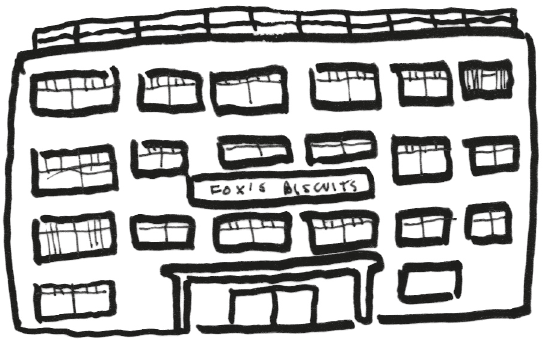
And lastly, you can’t talk about Batley without a nod to the Fox’s biscuit factory. Only sometimes, never frequently enough, it would pump out the smell of sweet dough and melted chocolate. But inside there was nothing resembling the fantastical Willy Wonka. It was just ladies in hair nets putting Jam ’n’ Creams and Vienneses into the plastic trays for the Christmas selection boxes.

It is difficult to try to explain my time in Batley. That I loved it and hated it with all the same parts of myself. I am anxious about having to try to sum up one of the most complex parts of who I am. I am inordinately proud of where I grew up. I would not be who I am if I had not spent my formative years there. But on the other hand, it was grim. I was incredibly unhappy living in Batley and I was preoccupied with leaving as soon as I could. I don’t have to imagine growing up there. I did it, however distant I have tried to make it feel.

In secondary school, my identity was solidified for me. I was a know-it-all, even though I wasn’t good enough to back up the label. After being called nerd and book-buster, I had no choice but to take on the mantle of being clever. But that just made it more complicated when I failed to actually live up to that epithet. There were much more consistent high performers in my classes. But they were quiet. My problem was enthusiasm. I always had ideas, suggestions and an arm up.
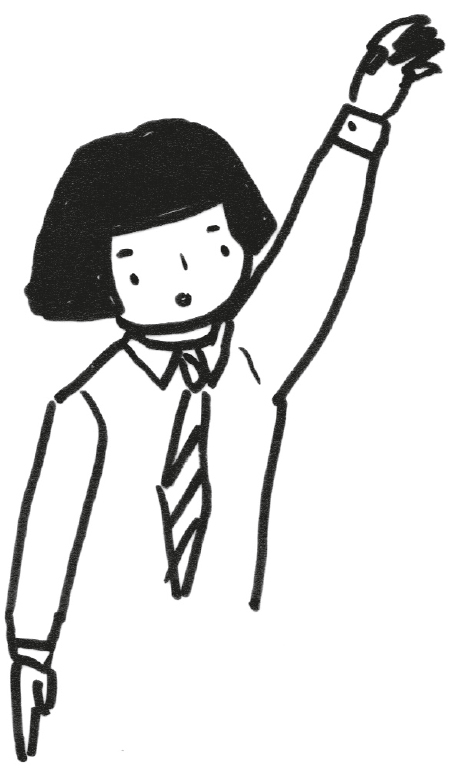
Then my personal brand expanded to weirdness. A girl from a primary school I’d thought I had left long behind ended up in the same class as me. I was happy to see her until she brought up the layers thing again. I think that’s why I am firmly attached to my statement bob these days. No fucking layers. Later, when I chopped my hair off, I was weird for having short hair. I was weird because I didn’t like the right music. I was weird because I made jokes and I would be the only person laughing.
I had a terrifically bad puberty. Being a teenager was a plague. From my perspective of narrator of this story, it feels like it must have transformed me. I don’t think I was an angry child. My parents talk of me as this sweet thing but high school and hormones and other teenagers forced me to build some protective bark around my softness. A better writer than I would call it a carapace.
My new body was tricky to sit in. I had never particularly mastered the old one either. I was the child in school with a hole in the knees of brand-new trousers and tights a week into September. I had scabby knees.For Christmas one year I asked my Granny Jayne for a ‘bum pad’ – like knee pads but a big pillow you strap to your bum for when you fall backwards (of course). Unfortunately, it didn’t exist, but I feel there was a gap in the market. I had roller blades and decided that if you fell backwards rather than forwards you could save your face, knees and hands by just sacrificing your arse. It only took one downhill tumble to understand why people didn’t do that. My fall was cartoon-like: my legs bicycling, making invisible circles in the air, before thumping down on my derrière. You hit your coccyx which is where all the nerves at the bottom of your spine nestle safely. When you topple back, you can’t stop the back of your head from pounding into the pavement. I learnt my lesson the hard way. But the thing about being an accident-prone child is that everyone just says you’ll grow out of it.

When I hit puberty if anything it got worse. I finally managed to graduate to my first broken bone – ice-skating, of course. After a decade of hospital trips, where a nurse would scathingly look at my swollen ankles and twisted wrists, my parents assured me that I hadn’t actually broken a bone. Forty-eight hours later, I started getting pins and needles undulating up my arm, and my dad took me to A&E. I left smug and in a cast. At school, I won a hat-trick of black eyes. I kicked my standing foot rather than the ball in a competitive game of breaktime footy. I toppled like a bicycle and had to walk around with a newly thick brow mottled with an impressive green bruise. But worst of all was the smashed teeth. Bolting round the corner of the sports hall with the enthusiasm of a Year 7, my new Kickers slipped. My face took the brunt of the fall – more specifically, my front teeth. One snapped clean in half and the rest seemed to move. I had to have braces and a temporary tooth made of filling.

There was a pretty convincing theory put forward by my mum for all these injuries. I had a new body. I had always been tall but I shot up further and quicker, leaving everyone behind. But my period seemed to take forever to show. Just as I was starting to feel left behind it arrived. Suddenly out bedoing’ed my tits. Not just some cute little lumps, but in two months I went from a B cup to a DD (think teaspoons of jam to those wobbling ornate Victorian jellies). It didn’t help that at 5 ft 9 (OK, 5 ft 8 and a half) my size 5 feet didn’t lend me much of a solid base. So I was led to believe that it was really just a waiting game until I was used to this vessel that would see me through until I got old and familiar with my body again.
But, of course, that is bullshit. I have had to learn to love the fall. I embrace the floor and the adrenaline. I have learnt never to look back at what tripped you up because very rarely is there an answer and even more rarely does it make you feel any better. I have accepted that sometimes people rush to help and others walk past snickering – both are humiliating and kind. And in some horrible, questionable way, the ache and the sting of cuts and bruises makes me feel a little more alive and a little more present in my body. But other things sit painfully. Knocked-over drinks, smashed plates, split rice bags, slopped food, dropped glasses, all still fill me with dread. They are illuminated arrows pointing at my inability to control my limbs.
In my mid-teens, I began to fixate on old cinema. Black-and-white was good but even better were silent films. I liked how words had been removed, that a universal language of melodrama replaced verbose explanations. The pinnacle of all this was Charlie Chaplin. I loved the slapstick. It’s freeing to watch someone with even less luck than you. Each smack, blow and thud reminded me I was not alone. I still think if all these creative endeavours fail and I have to get a real adult job, I can always re-train to be a clown.
Teenage girls are both evil and genius. I love teenagers. It’s not a widely held opinion. They have a potency and an affinity for the extreme which I have never really grown out of. Melodrama is a currency we share. It manifests in my adult self as hot-headed judgement, brashness and revelling in sweeping unsubstantiated generalisations.
Adolescence is also the ultimate vulnerability. We are left wondering who our friends are, how to grasp the terrifying thought of independence and tackling how we are seen by the outside world. It can leave you in a permanent out-of-body experience, constantly weighing yourself to someone else’s standards. I think that the inherent core-shaking experience of being a teenager can make people vindictive. The opportunity to be mean, to take a dig at someone else, acts as a momentary cure for their own sense of inadequacy and their own pain.
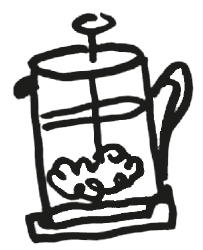
But – oh boy – it is hard to be on the receiving end of that. Even if you can tell yourself that it is not about you, it is hard to get through each day when you are the scapegoat for a room full of anguish.
Because I fell over a lot, I used to think that in many ways it would be easier to be physically attacked. I was used to bruises and bleeding. But the emotional torment was something I felt that I was not equipped to deal with.
In many ways, I don’t want to write about the specifics of what was said and done to me. Partly because of the deep fear that, if I am explicit, I’ll be told once again that I was overreacting and that maybe I deserved it. Partly because I don’t want to give the torment any more of my time. And maybe in the deepest corners of myself I feel like I’m giving the world ammunition. But it is important to give the details.
It started with someone else being bullied. She was my friend and she lived on a pig farm, and that alone gave people enough material to rip her apart. The group of girls who were picking on her were ‘nice’ girls. By that I mean they did well in school, they didn’t get in trouble, they were pretty and largely middle class. They came from ostensibly functioning homes. But they modelled themselves proudly on the Plastics from Mean Girls. They hadn’t picked up on the satire.
One particular morning, my friend was on the end of some particularly slicing remarks and I lost my temper. I said no. I refused to believe this was how we treated one another. They looked at me with shock. I left the room feeling like I had won, that I had stood up for my friend. But the real consequence was that the focus turned on me and my friend turned too, no doubt joining in because she was relieved to no longer be the target. The jokes about pig shit quickly dwindled and a laser vision was focused on my every move. I walked funny, I mispronounced words, I was too clever, my face was too round, I looked like a man, I was a man, I was a dyke. My name was weird so people would mispronounce it. But it got worse. I tried to keep it in and not to react. But what I could not control was the shame. All those eyes on me and I could do nothing except for igniting bright red.
When she blushes all you have to do is count down from ten and she’ll be crying by one.
…and that is how fun new games are invented. Not one person said a thing. When it happened once in class and once in a school play rehearsal, the adult witnesses said nothing.
At the height of my agony, after nights awake dreading the next day, I went to my form tutor. I told him how unhappy I was, that the girls in my class were causing me so much pain with their asides, their pointed remarks about me. He told me to try to fit in more. That if I didn’t give them a reaction they would get bored… The gaps in that advice rang louder than the words. He didn’t need to say that with their boredom would come another victim. He didn’t need to say that I was weird so brought it upon myself. He didn’t need to say that he didn’t really believe that it was that bad. Because it was loud and clear.
I went to the deputy headmistress and she offered me much of the same, but raised the advice to new heights. If you stopped crying, then they would leave you alone. The blame was firmly placed on me. She made it clear that she thought that I was a crybaby and an over-sensitive, over-reacting one at that. I still am a crybaby and proud of it. Why did I have to change who I was to stop this? Why was I being punished twice? Once by thirteen-year-olds, who were replicating the words and shaming that we can only presume they were enduring themselves out of sight, and then once again by the adults in charge. I left the room wishing that I had been punched because then at least I’d have evidence.
Why do I feel so much? I cried to my mum that night. She sat and pondered, stroking my hair.
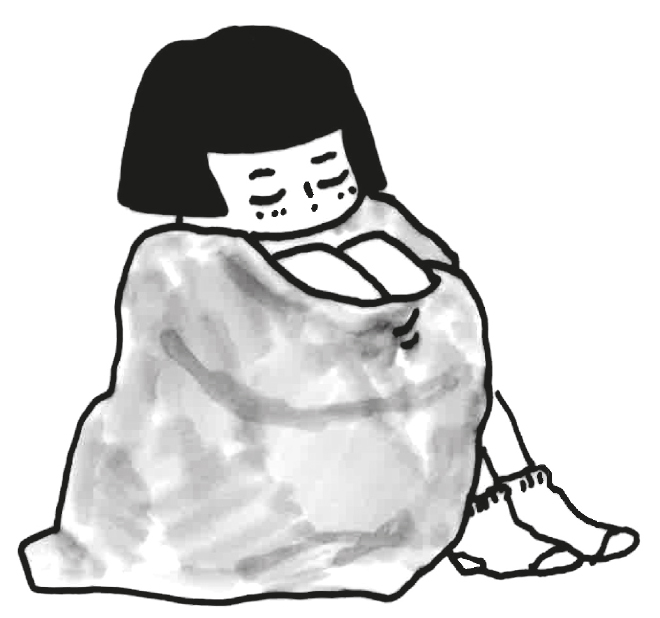
It is a gift to feel this much, she told me. But lying there it felt like a heavy burden to try to contain all that was boiling within me. I couldn’t imagine a time when I might be able to safely restrain the overflow and, today, I still can’t. I can hold the feelings better but repression isn’t my strong suit.
All the while, my class was heralded as the nicest in the school. I realised that no one was going to save me. Lying awake at night, I was a monument of dread frozen by the prospect of the next day, and the one after that. We looked for new schools but the options were too thin and too far away. When I came home each afternoon my parents were on the receiving end of my rage. I screamed and sobbed and burnt. They didn’t know how to help, they’d gone into the school and spoken to the teachers. Nothing changed.
It will never be like this again. It will never be as bad as this ever again. You can get through this.
At the end of the school year, I was done. A gleeful countdown began again and like Pavlov’s Dog I started to weep on cue. Though, today was different. I turned not away from them but towards them. I climbed onto a table and I began to scream…
You are so unhappy with yourselves that you have to pick on me. Well, just because I’m the victim now doesn’t mean that you’re safe. You all hate each other with a passion and will betray your so-called friends just so that it doesn’t happen to you. Well, it will.
I’m not sure I managed to be quite as cohesive or articulate as that, plus with hindsight I wonder how much could be understood between my snotty sobs. But I know that they understood when I pointed and concluded: Each and every one of you is a cunt who will die alone.
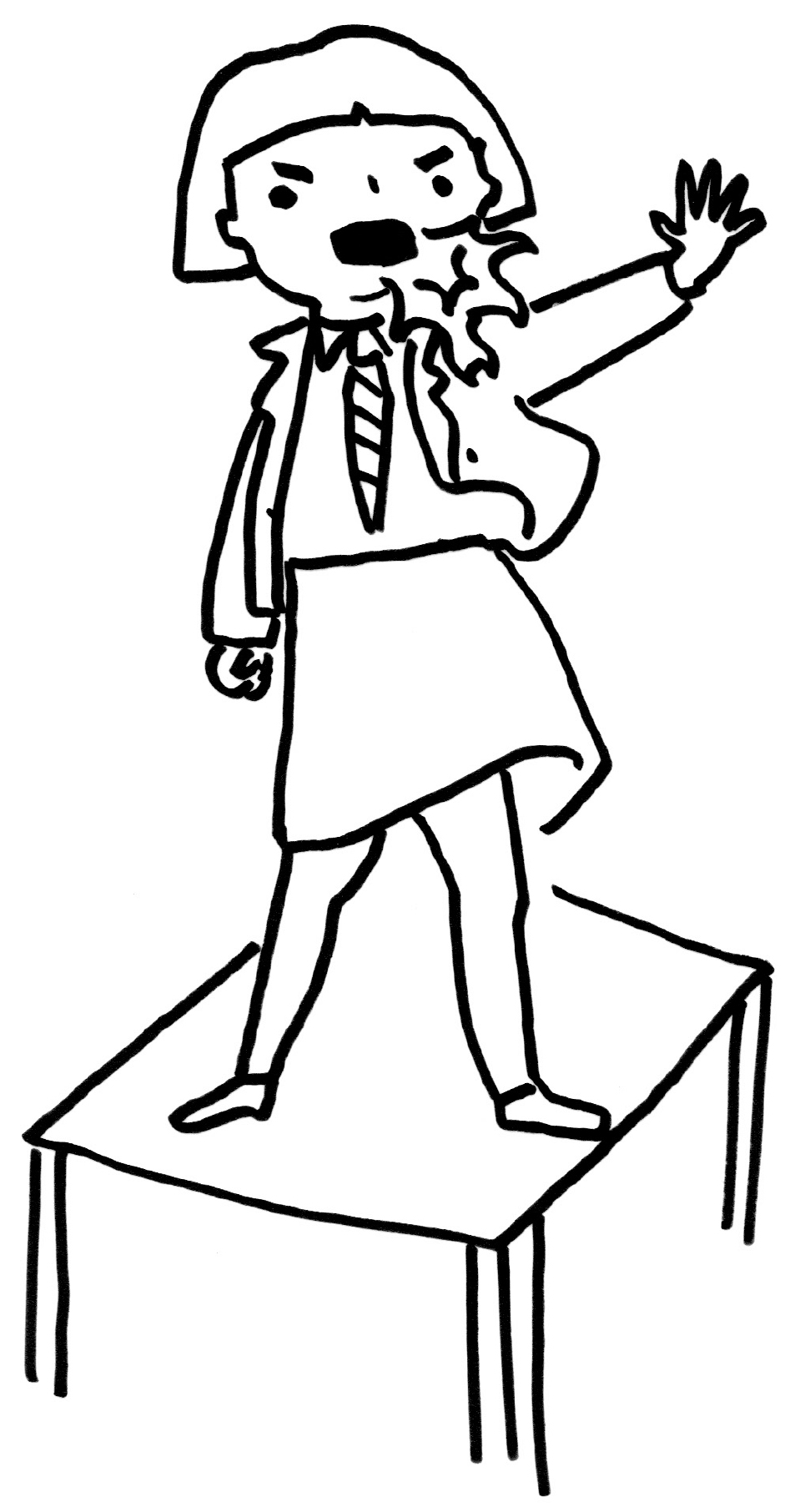
They pretty much let me be after that. I don’t think because my words had some transformative effect, showering them with self-awareness and compassion. But it probably triggered the realisation that perhaps I was unhinged. Fear is a great equaliser. If only a teacher had told me all I needed to do was stand on a table and throw around some expletives, I might have got some sleep that year. I have never been prouder of myself. In moments of chaos, fear and sadness, I think about thirteen-year-old Kaiya and that she saved herself in the only way she knew how.
I’d like to talk about the teachers who seemed to think it was in their job description to try to destroy my hopes and dreams. I had lost a lot of faith in adults as well as in my peers. I had seen teachers repeatedly ignore homophobic slurs in class. I’d even been told that I shouldn’t be upset about comments because after all it wasn’t true, right? But beyond just a failure to care for the emotional wellbeing of their students, some of the teachers (I’ll talk about the good ones soon, I promise) also seemed to think that their duty was to teach children to obey and regurgitate. Education, in their eyes, was about teaching kids a lesson.

When I started secondary school, I had been desperate to study English properly – with teachers who taught specific subjects. I wanted to read books and talk about them with adults who had chosen to devote their life to exploring stories. I was excited for creative writing and to read Shakespeare and poems. It all sounded very adult. I viewed it as the start of my career as a writer and presumably it would be something I’d be good at it. I’d been reading for years. God, I couldn’t wait.
When I actually started, I came across the greatest enemy to adult literacy and the enjoyment of reading and writing – English teachers.
My first was Mr Fisher, the form tutor who failed to help me even slightly when I was bullied. Before that I didn’t really mind him. He was mainly embarrassing in that way that only old white men manage to be. For example, he would describe passages of a book as sexy, in my eyes a crime punishable by death. Worse than this, Mr Fisher seemed to believe that knowledge was something one owned or held like a physical object. It sat in his hand and we, his lowly wards, had nothing at all to offer. It was this understanding of knowledge which meant that he was able to frequently tell me (and others, no doubt) that we were wrong. Slowly, my indifference turned into rage.
We had a heated discussion when I questioned why the school had more assemblies a week split by religion than we did as a united student body. The two options on Mondays and Fridays were the Christian assembly or the Muslim assembly – an odd arbitrary divide which left the non-believers, Sikh and Hindu kids to decide where to go… (clue: white kids in one room, PoC in another). My main issue was that I hated the Christian assemblies. Mr Fisher later retaliated by writing a ‘think piece’ for the school newsletter about tradition and the need to keep alive old institutions such as hymns and the Bible. I thought it was a pretty lame move.
It bled into lessons. For coursework, we were asked to design a stage for J.B. Priestley’s An Inspector Calls. He prescriptively told us exactly what to do. I tried to be inventive and made up a third-wall-breaking concept (not that I knew what one of those was) where the audience were placed behind a two-way mirror to watch the scene unravel; he marked me down for being anachronistic. At parents' evening, Mr Fisher made me cry when he told my mum I was lazy, that I didn’t read things properly, that I was clever but didn’t bother following it through. I began to hate English.

He retired early. I hoped that this meant that I could get back into what I thought should be my favourite subject. He was being replaced, like lots of the old men in the school, by a new graduate, someone who seemed to want to be there and who actually liked children.
But that bubble burst quickly too. Miss Radcliffe hated me. I’m not sure why. Maybe because I had hung round after class early into term and asked her about which novels we were studying. I had just read The Catcher in the Rye and loved it because I too was an adolescent full of rage who thought I was surrounded by phoneys. But she said she wasn’t a fan of it. Fair – it is a bit pompous. What about 1984? She hadn’t read it and I was too unworldly to hide my surprise.
I thought I was clever too, so maybe it was that. Know-it-alls are insufferable and the turn of events that followed after my GCSEs ensured that I dropped that particular persona pretty quick. But this teacher also took it as her responsibility to knock me down a peg or two. So she would ask the class if anyone else had an answer when I was the only one with my hand up. Anyone else? Someone other than Kaiya? Miss Radcliffe preferred to move on, leaving me hanging rather than let me speak.
Teachers have a sacred responsibility: to uplift. But for many of us, we are not that lucky. We have to face teachers who gaslight us. We have been repeatedly told that we are one thing: lazy, thick as shit, stupid, slow, a waste of space. It comes from the mouths of people we trust, friends, family and teachers. It takes so much to not be pushed into apathy or pushed into fulfilling those labels. The energy required to resist is enormous. Often it takes years before we realise we have been lied to. And that is if we’re lucky enough to twig later on. Too many adults go through life with the weight of being told who they were by teachers; it is a heavy burden. But, please remember, it is lies. You are not stupid. You are not lazy. You are not a lost cause. We have been caught and tangled in the net of teachers’ ignorance and laziness. We have tied our self-worth to their statements and at some point we must begin the slow and arduous process of breaking free and seeing that we are more than they said we were.
At school, I was wise enough to keep my ambitions of writing close to my chest, nestled away in a deep corner of myself. It was a secret I knew, if let out into the world, would be crushed. It felt so delicate that even one joke or comment could have suffocated the tiny flames. It didn’t come up mainly because we didn’t do much creative writing in English lessons; I can think of only a handful of incidents. The last was ahead of our GCSEs.
Write about a journey.
The year of my GCSEs I was fifteen. I came out of school and, as always, my dad was in the car waiting to pick me and Cas up. As we drove down Carlinghow Hill towards home he said I think I found my birth father today.
It had been ten years since he had found Jayne, and I knew he had spent time trying to find his dad, but the name Michael Taylor was an impossible obstacle. But that day, Adoo typed in Michael Stuart Brough Taylor (the name on his birth certificate under Father) into Facebook and someone had popped up. That evening, we all crowded round the computer looking at a website linked to the account. There was a photo of a man with my dad’s eyes and even more weirdly – the same facial hair.
The Stones always spent a long time contemplating and theorising about who we were. It was already a teenage pastime. But it felt so rare and magical to have an answer, rather than just another question. So when we were asked to write about a journey in class, I knew I had to write about the four-and-a-half-hour road trip that dad and I took. In one day, we drove from Batley to Bognor Regis and back to meet my great-grandmother (his grandmother) for the first time. My essay was soppy and sloppy. Full of sentimentality that is unavoidable when you’re fifteen. But I also described how on the way down we laughed and made jokes nervously, awaiting a revelation. I wrote about one of those moments after which nothing can ever be the same. It was the first very personal thing I ever wrote and showed anyone. When I handed it in, Miss Radcliffe returned it with a note: I don’t understand why you would describe your grandmother as an alien. Your grammar needs work.
Luckily, my skin had grown thick with years of comments about my spelling and grammar. I had an adolescent self-assuredness that I was simply misunderstood and in the wrong place. I left feeling like I had written something I could be proud of because she hated it, so I must be doing something right. When she praised someone else’s work about their first shiny red bike, I knew I just had the wrong crowd here. I am so thankful that I had louder voices telling me that I wasn’t bad or stupid. Otherwise, I think I might have been at risk of never writing another word after that.
